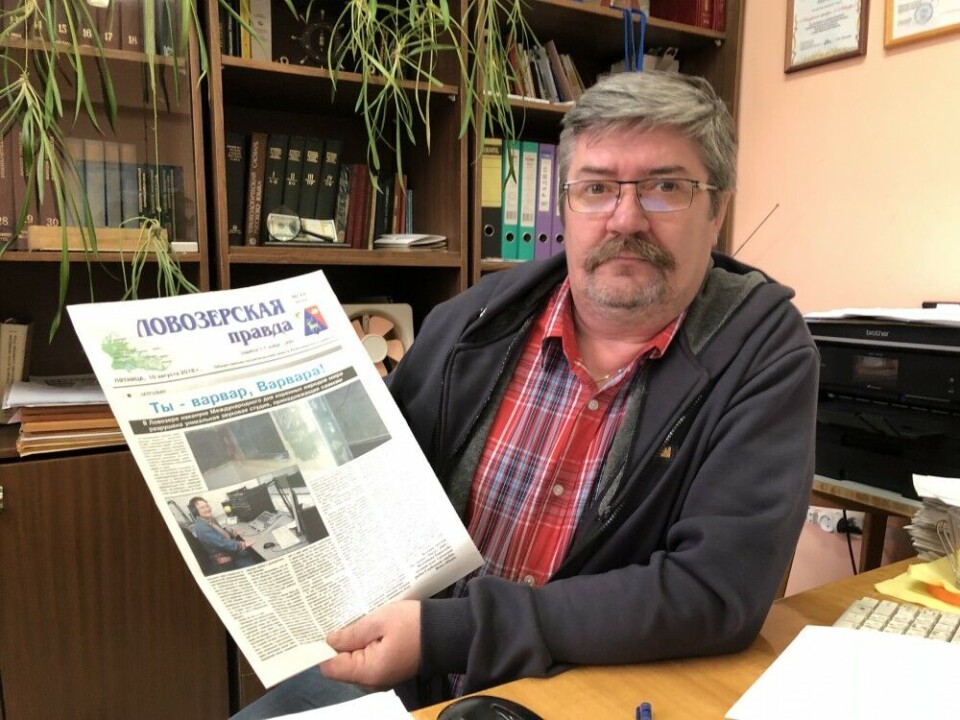
Where is the Barents cooperation, wonders former reporter with Kola Sami Radio
It is said that people-to-people cooperation between Northern Norway and Russia continues as normal, but in Lujávre it´s gone quiet.
“Sami friendship and life of ordinary people suffer from the politics. One cannot say that mentalities differ and apologize the lack of cooperation with different mentalities and therefore a lack of understanding for each other. We are Sami. We are the same,” says chief editor of Lovozerskaya Pravda, Valery Tkachev.
He remembers a time when the Kola Sami peoples had their own radio station as a result of cooperation between four countries.
“We built it together. We sat in the studio side by side. People from NRK in Norway, from Yle in Finland and from Swedish Radio.” Valery smiles a bit. It’s a memory of good times.
Tkachev picks up the latest issue of his newspaper and shows how the studio now is completely slaughtered. It was not possible for me to take a look at the remains of the studio, but Valery shows photos.
“For me, who worked in the studio and remembers that time, it’s incredibly hurtful to see the this.”
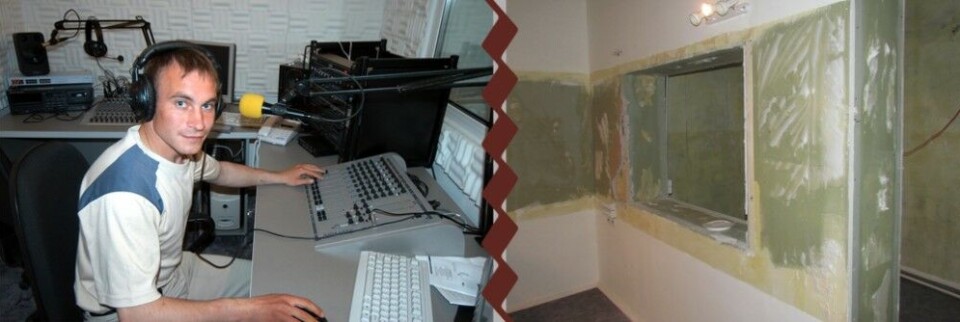
Valery Tkachev observation is that small contacts across national borders now are non-existing.
“It has become completely silent. Nobody comes here and it looks like there is no form of interest. The Norwegian government does not finance simple contacts between ordinary people.”
Why do you think this is?
“I don´t know why, but I suppose it’s because they are against Russia,” the editor replies and adds there are no longer any contact between journalists either.
“t has become quiet at the organization of Sami journalists and also at Barents Press, almost nothing happens there, as far as I can see.”
What do you think about it?
“When there is no contact, it will not be better and not worse either, but in my opinion, journalists are the primary carriers of information.”
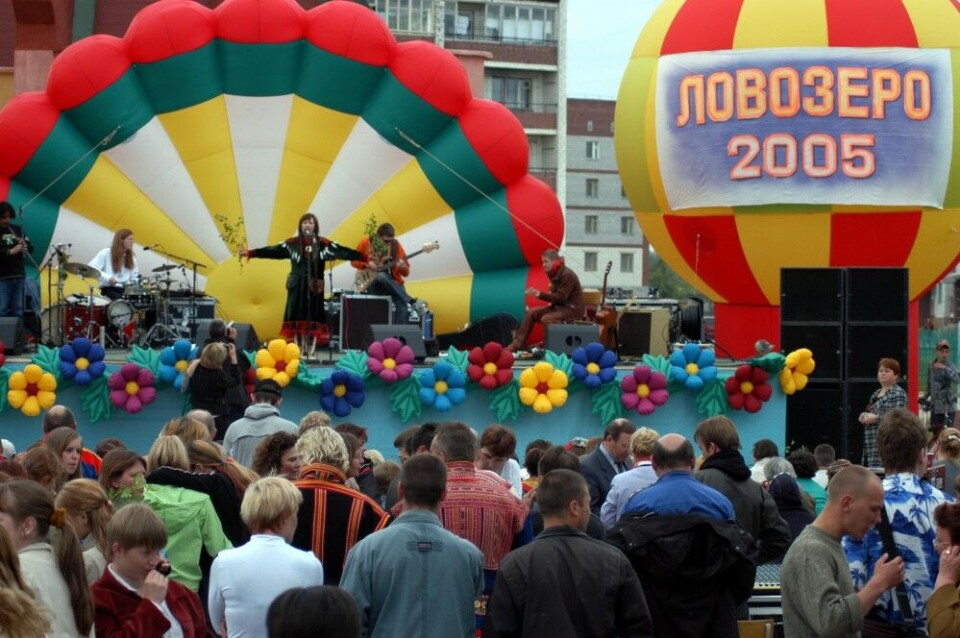
Over the heads
Lujávre (or Lovozero in Russian) is located 180 kilometers southeast of Murmansk, or 140 kilometers if you choose a more bumpy road. There is an airport which is the starting point for helicopter fishing trips on the Kola Peninsula, and most of the customers are wealthy moscowites.
The village has fewer than 2800 inhabitants. The Sami make up 920 of these, and the unemployment rate among the Sami people is estimated at 35 to 50 percent. The monthly allowance is meager, but alcohol is still somehow acquired. There are no traces of humanitarian work, apart from the help people give each other.
“Putin lives like a tsar, but his people are starving,” notes one of the inhabitants.
There are major challenges related to alcoholism, and transition from tundra life to life in apartment blocks has been difficult for some. The hospital is closed, now there is only a policlinic left. It is also reported that civil rights are under pressure.
Gennady Lukin warns against the Barents cooperation flying far far over the heads of people in Lujávre and that it takes place at elite level.
“Previously Sami lived together without borders,” he reminds.
“Later there were borders. With the Barents Secretariat and Saami Council it became possible to run joint projects,” he describes and adds that he is very grateful for the сo operation with Karasjok municipality which let him, among many others, attend a course in Northern Sami language.
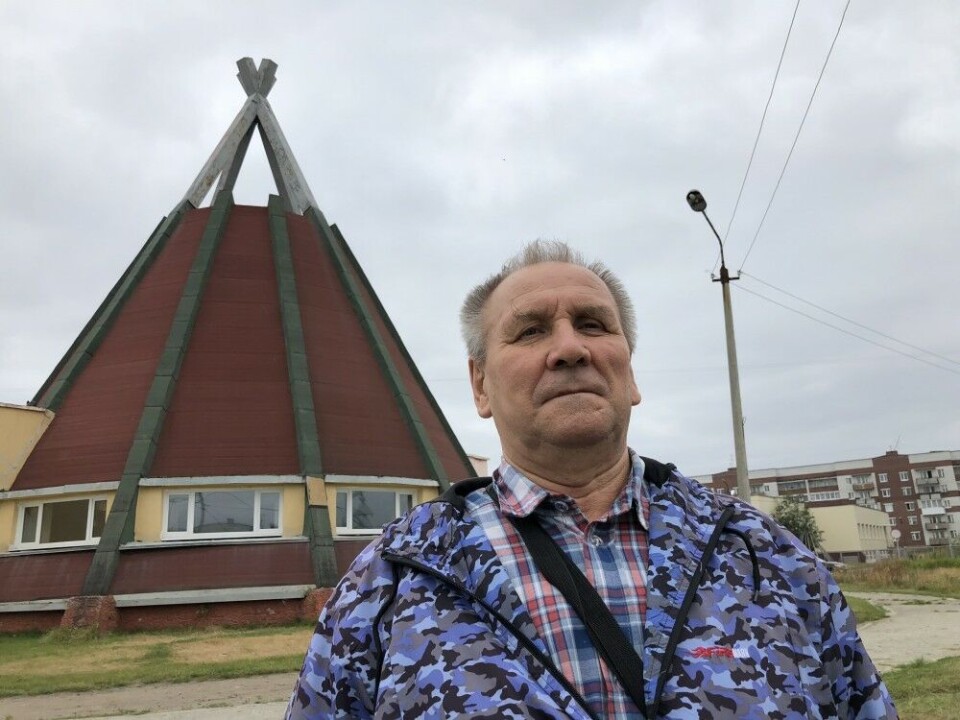
“In the 1990s there was active exchange between Karasjok and Lujávre, it was a nice time that I am thankful for. It brings other perspectives and a different understanding when one can choose to speak ones mother tongue,” he points to and emphasizes that education in Kildin Sami language is an area Lujávre has great need for.
“Together with culture, reindeer husbandry and development of the Sami community. But instead of getting easier it has became harder to cooperate. The Barents Secretariat in Murmansk does not help in finding partners or information. It may be so that only elite Sami succeed because they know how the system works. And not everyone are capable of finding information on the internet. Earlier we found a way through the system, but now it seems like the door has been closed.”
Lukin also notes that there is hardly any information available on how regional fundings internally in Russia are distributed, and he calls for democratization and transparency.
Gennady himself had a dream of becoming a reindeer herder, but his mother advised him against this as she thought the work was too hard. Now he thinks children in Lujávri should learn.
“So that they want to work in reindeer hurding. But he reindeers are on the tundra and the kids are here, only in summertime do they travel to the tundra.”
Lukin tells how the Soviet era affected the Sami vocabulary for example the reindeer-herding terminology disappeared.
“And now I’m afraid the culture dies.”
Decreased
Sergei Filipchenko describes that in the 1990s he believed cooperation over the northern borders would increase, but instead there has been less activity.
“At that time there were tourists, culture representatives and delegations. There were concerts and sport events. We thought this would grow. Now we see what damage can be inflicted when governments have little contact with each other. It would have been better if Norway had an independent attitude. Then the friendship would be stronger and better. Because it’s only when we meet each other we are able to develope ideas together.”
Filipchenko also describes a negative spiral where the radio has been closed, the hospital has been closed and where political rights erodes like direct elections for the position as mayor.
Maria Medvedeva has previously published a book of Sami children’s toys, and is now working on a manuscript on Kildin Sami joiks.
“It is very difficult to find a partner on the Norwegian side while it is necessary in case you are going to apply for support. I feel like our voice is not heard.”
What is required for the voices to be heard?
“We just have to keep working. We must be able to stand strong together. But if no one is paying no one is willing to sing.”
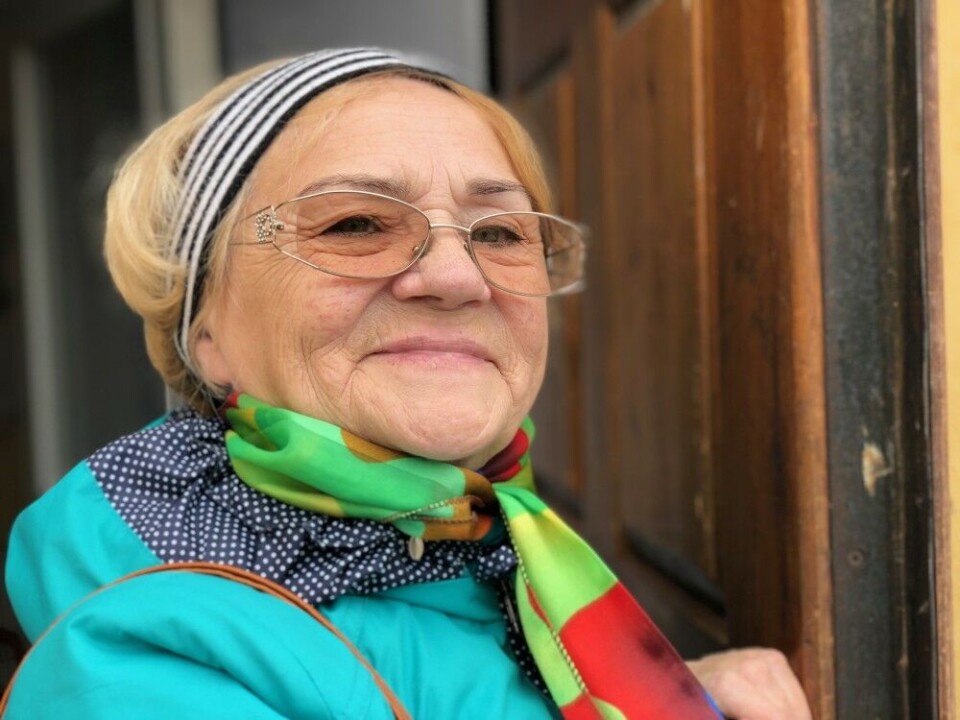
A great pity
“What happened to The Kola Sami Radio is a great pity,” says former NRK Sápmi director Nils Johan Heatta.
The project started in the 1990s when GTRK, the regional television company in Murmansk, decided to close the Sami cable radio broadcasting due to lack of financial abilities.
“We, the leaders of the Sami brodcasting in NRK, SVT and Yle, made a project funded by the EU, Interreg, the Nordic Council of Ministers, the Norwegian Ministry of Foreign Affairs and the Barents Secretariat, but that could never have succeeded without then the director of GTRK, Dimitry Peredery. He was always so positive and helpful.”
Heatta describes major challenges with the technical development of the radio station, especially with obtaining the broadcasting permit.
“It was difficult. Very difficult. We had neither economic nor political support from Russia.”
Wanted permanency
The radio station officially opened in 2005 and the goal was a permanent operation. After numerous attempts, it became clear that it was impossible to get further funding from the Norwegian side. Nils Johan Heatta says it needed to much work to move on with the project, it also became economically stressful.
“Project support requires some amount self-financing, and it was concluded that there were limitations for how long one could charge Norwegian, Swedish and Finnish license payers. We found a solution implying the radio would produce content, get paid for the content and finance it’s own operation using that income. It worked for a while, but it became harder and harder to maintain productivity and finally the income totally discontinued. There has more or less been no contact after 2010. We had used a lot of initiative, time and effort to make this work and it is very, very sad that it ended so. I personally had invested a lot and I think it was a fantastically important project. But the end of the show was that they lost their only radio broadcasting in Sami language and we lost content input from the Sami community at Kola.”
The main project for the radio had a price tag of about 1,8 million Norwegian kroner (€186,000), including 65,000 kroner (€6,900) in Barents funds.
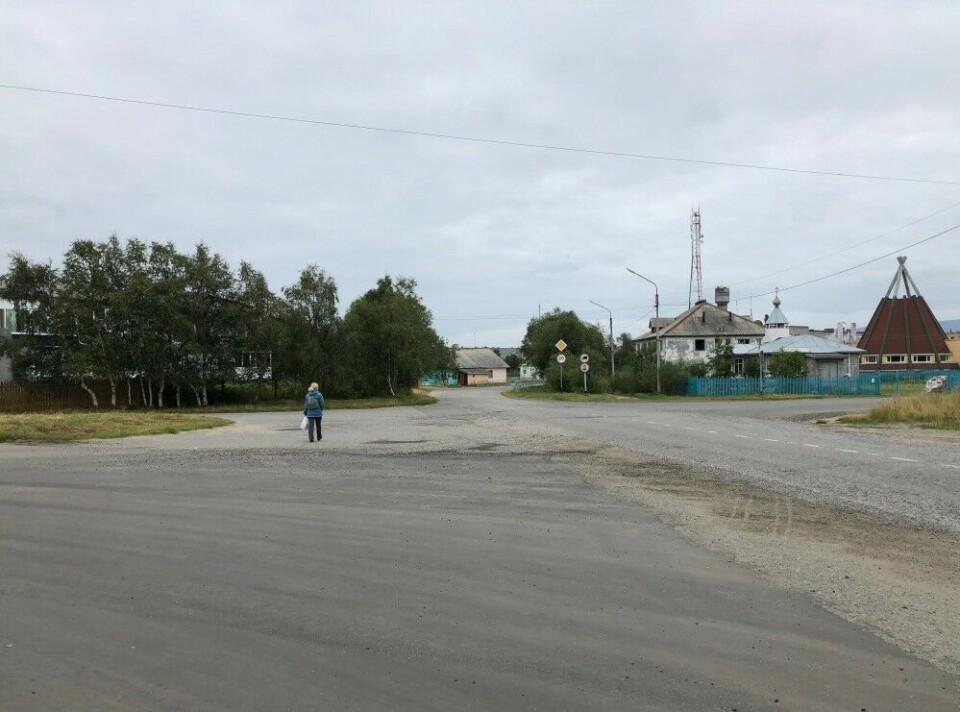
Still a need
Heatta says that as he looks back he believes they did what was possible.
“The question was if we should have tried one more time, but we had many other tasks as well. The need is still there and technology has changed. Perhaps it wouldn’t be so difficult now, as one can produce using consumer technology. Still, anyone who produces content of course need to get paid to be able to butter their bread.”
The former NRK Sápmi director says he understands why Lujávre feel it´s become quiet.
“It seems the energy in the collaboration is not the same it used to be. Perhaps it depends on enthusiasts, as it was in case of Karasjok municipality cooperation with Lujávre. Perhaps it is also so that the world is becoming more selfish. We hardly have time for anyone but ourselves, and hardly that, and cooperation and contacts run second. In the 1990s and 2000s it was very new and exciting that the borders opened. The ideas originated in the field of contacts. Now the novelty effect has probably descended.”
Nils Johan Heatta does not think people differently about cooperation because of the tense political situation between Norway and Russia.
“But I think maybe the Sami community devotes so much time to working on a higher level that it does not leave much available time. At the same time, it is clear that an extremely bureaucratic Russia did not provide any help either. It was a pure hell, and it did not make it easier for us neither to get political nor financial support, apart from Dimitry Peredery.”
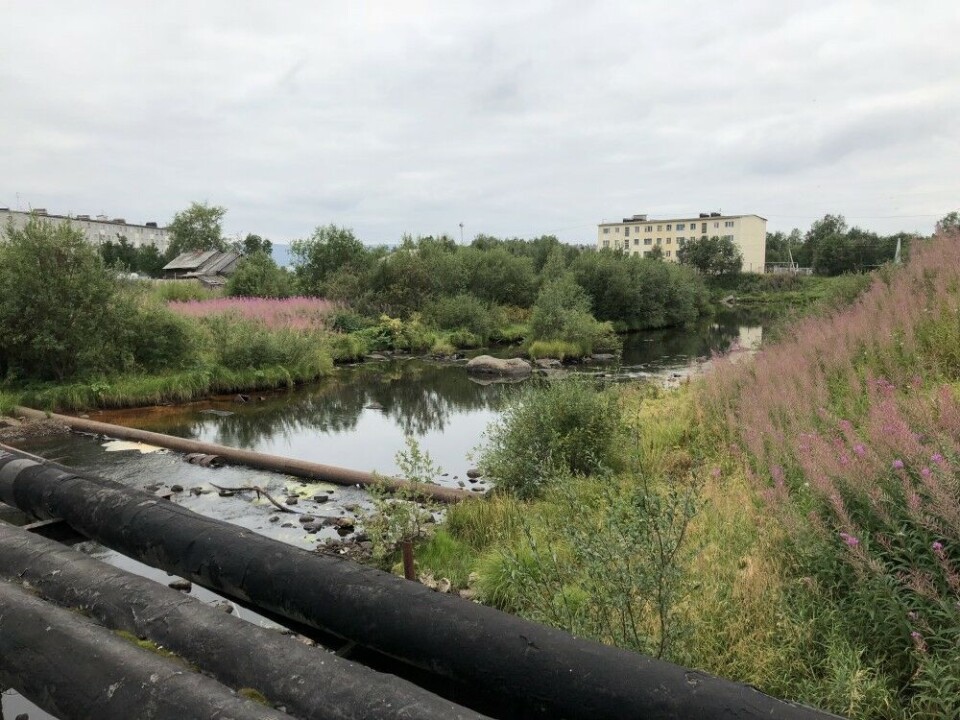
Surprised by the criticism
“It’s called people-to-people cooperation exactly because it’s people themself who are supposed to establish and develop contacts across the borders, the Barents Secretariat responds to the criticism from Lujávre.”
The head of the Barents Secretariat, Lars Georg Fordal, is surprised by the criticism stating its difficult to get information from the Barents Secretariat in Murmansk and that there is little help in finding a partner. Having a partner on the other side of the border is necessary to get a possibility to apply for financial support.
“The Barents Secretariat’s office in Murmansk has a lot of outward business. As we can see, they contribute to realization of numerous projects. I have only kind words to say about our employees in Murmansk, and I think they are dutiful and perfect at providing information about our work as well as finding partners. In case somebody is dissatisfied with the acceptance at the Murmansk office, he should contact us in Kirkenes and we can find out what causes this dissatisfaction,” comments Lars Georg Fordal.
Fordal underlines that it is important that people do not have unrealistic expectations about how active the Barents Secretariat can be in a project.
“We can contribute with funding and provide input to finding relevant partners, but ultimately it is the organizations themselves who must establish contact with partners, find a common platform for cooperation and, not least, carry out the project. We try to make projects implementation as easy as possible, any questions are welcome at info@barents.no.”
There are many other voices in Lujávre stating total standstill in people-to-people cooperation. What´s your comment?
“It’s a pity if someone in Lujávre thinks it has gone quiet around people-to-people cooperation. It indicates that maybe there are fewer projects in this area. The Barents Secretariat marks project activity at the same level in 2017, and indeed projects number increase. If It’s quiet in the Lujávre area, so it’s only for those who might want more activity to find Norwegian partner and initiate cooperation. People themselves are supposed to establish and develop contacts across the borders,” says Lars Georg Fordal.
“The Barents Secretariat’s main role is to facilitate new project initiatives and to provide growing number of organizations and associations with opportunities to be materialized. So we rely on people in Lujavre and elsewhere in the Barents region to take this initiative. If anyone wants the Barents Secretariat to visit Lujávre or any other place to describe the opportunities available, then we would be happy to do so.”
This article is part of a serie of articles with focus on life and contacts in the Norwegian-Russian borderland in the north.
















